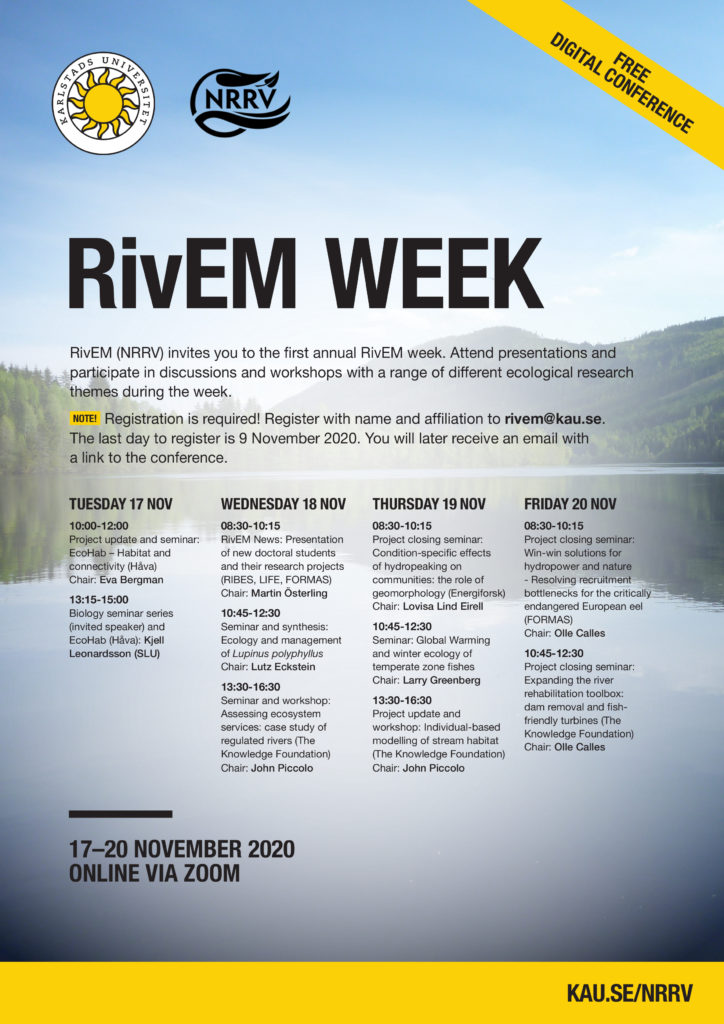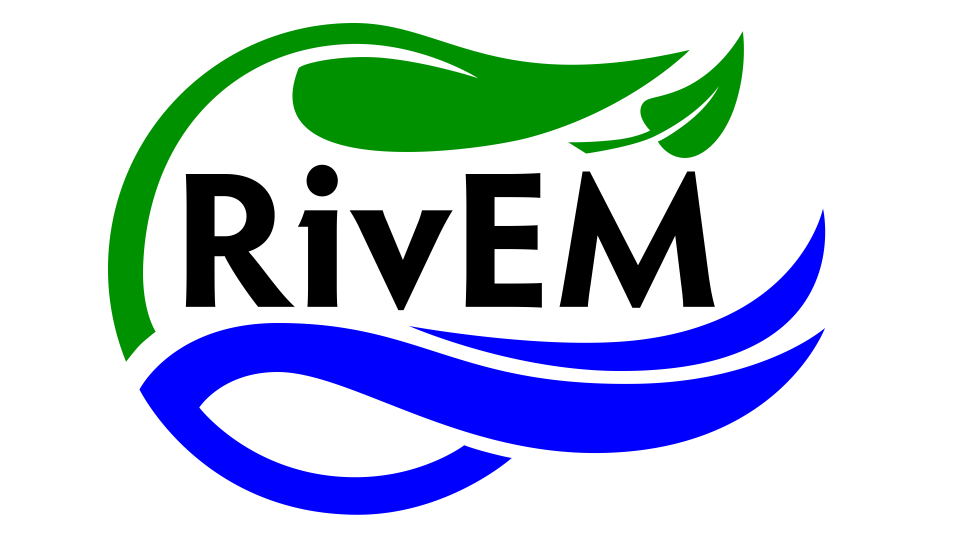RivEM (NRRV) invites you to the first annual RivEM week (17-20 November 2020), where KAU researchers and international guests will present and discuss some of the exciting projects we have been working on. Attend presentations and participate in discussions and workshops with a range of different ecological research themes during the week.

Detailed program
The program may be subject to minor changes (e.g. presenters, presentation titles and time slots). Please refer to this site for the latest version of the program.
TUESDAY 17 NOV
10:00-12:10
Project update and seminar: EcoHab – Evaluation of habitat and connectivity (HaV, HåVa/Energimyndigheten, Energiforsk)
Chair: Eva Bergman
10:00-10:05 Welcome and introduction – Eva Bergman (Karlstad University)
10:05-10:20 Why do some fishways work as expected and others not? – Gunnar Hellström, Lovisa Sjöstedt, (Luleå University of Technology)
10:20-10:35 A method to derive the behaviour rules that migrating fish use to find their way in rivers – Gunnar Hellström, Lovisa Sjöstedt, (Luleå University of Technology)
10:35-10:50 Downstream passage of roach and salmon – effects of local conditions on passage success – Rachel Bowes, Larry Greenberg (Karlstad University)
10:50-11:05 Coffee break
11:05-11:20 Ecological limits of hydrologic and geomorphic alteration of reaches with high flow velocity in boreal rivers – Roland Jansson, Birgitta Malm-Renöfält (Umeå University)
11:20-11:25 The role of tributary mouths as hotspots of riverine plants in run-of-river impoundments – Roland Jansson, Birgitta Malm-Renöfält (Umeå University)
11:25-11:40 Ecological functioning of tributary mouths: does structure of the tributary mouth impact biodiversity (fish focus) – Joacim Näslund (Swedish University of Agricultural Sciences)
11:40-11:55 Tributary temperature and water chemistry variation and its effect on the main stem river system – Leonard Sandin (Norwegian Institute for Water Research)
11:55-12:10 General discussion
12:10-13:15 Lunch break
13:15-15:00
Biology seminar series (invited speaker) and EcoHab (Håva): What ecological effects can we expect that improved connectivity will have on fish populations? – Kjell Leonardsson (Swedish University of Agricultural Sciences)
WEDNESDAY 18 NOV
08:30-10:15
RivEM News: Presentation of new doctoral students and their research projects (RIBES, LIFE, FORMAS)
Chair: Martin Österling
08:30-08:45 Introduction – Martin Österling (Karlstad University)
08:45-09:00 Migratory response of diadromous fish to river continuity – Samuel Shry (Karlstad University, LIFE)
09:00-09:15 Host-parasite interactions between native Swedish parasitic mussels and their host fishes –Sebastian Rock (Karlstad University, LIFE)
09:15-09:30 Quantification of habitat alterations on the fish community – Henry Hansen (Karlstad University, RIBES)
09:30-09:45 Field monitoring methods to assess fish pass efficiency – Florian Eggers (Fiskevårdsteknik, Karlstad University, RIBES)
09:45-10:00 New approaches to facilitate downstream migration in regulated rivers – Velizara Stoilova-Tsvetanova (Norconsult, Karlstad University, RIBES)
10:00-10:15 Atlantic salmon and brown trout habitat modelling under hydropeaking conditions – Louis Addo (Karlstad University, FORMAS)
10:15-10:45 Coffee break
10:45-12:30
Seminar and synthesis: Ecology and management of Lupinus polyphyllus
Chair: Lutz Eckstein
10:45-11:00 Workshop introduction and presentation of invited speakers – Lutz Eckstein (Karlstad University)
11:00-11:15 Demographic models as a tool to guide management – Satu Ramula (University of Turku)
11:15-11:30 Effects of Lupinus polyphyllus on vegetation in road verges and effectiveness of Lupinus eradication actions in the county of Uppland (Sweden) – Jörgen Wissman (Swedish University of Agricultural Sciences)
11:30-11:45 Effects and management of the invasive legume Lupinus polyphyllus in species-rich mountain meadows – Wiebke Hansen, Yves Klinger (Justus-Liebig University Giessen)
11:45-12:00 Flowering phenology of the invasive legume Lupinus polyphyllus along a latitudinal gradient in Europe – Kristin Ludewig (University of Hamburg)
12:00-12:30 Group discussions and synthesis
12:30-13:30 Lunch break
13:30-16:30
Seminar and workshop: Assessing ecosystem services: case study of regulated rivers (The Knowledge Foundation)
Chair: John Piccolo
13:30-13:50 Ecosystem services provided by Atlantic salmon in regulated rivers – John Piccolo (Karlstad University)
13:50-14:10 Complex social-ecological relationships and the framework of ecosystem services – Sanna Stålhammar (Lund University)
14:10-14:30 Monitoring river restoration success using ecological research and the ecosystem services approach – Ivan Olsson (LIFE CONNECTS / County Board Skåne)
14:30-14:50 Coffee break
14:50-16:30 Workshop: Assessing ecosystem services in practice – Sanna Stålhammar (Lund University). Only for pre-registered! To sign up for this exercise, send an email to sanna.stalhammar@lucsus.lu.se.
THURSDAY 19 NOV
08:30-10:15
Project closing seminar: Condition-specific effects of hydropeaking on communities: the role of geomorphology (Energiforsk)
Chair: Lovisa Lind Eirell
08:30-09:10 Project report – Lovisa Lind Eirell, Johan Watz (Karlstad University)
09:10-09:30 Macroinvertebrate sampling in hydropeaking rivers: testing Hester-Dendy samplers in a laboratory environment using different flow conditions – Mattias Hansson (Karlstad University)
09:30-10:00 Sediments in reservoirs: carbon sinks, greenhouse gas sources, and legacy pollution – how can we deal with them? – Sebastian Sobek (Uppsala University)
10:00-10:15 Closing discussion
10:15-10:45 Coffee break
10:45-12:10
Seminar: Global Warming and winter ecology of temperate zone fishes
Chair: Larry Greenberg
10:45-10:50 Introduction – Larry Greenberg (Karlstad University)
10:50-11:10 The effects of temperature during embryogenesis on juvenile fish: brown trout and Atlantic salmon in an altered climate – Larry Greenberg (Karlstad University)
11:10-11:40 From behaviour to genes: anti-predator responses of brown trout (Salmo trutta) under winter conditions – Karl Filipsson (Karlstad University)
11:40-11:55 Post-release performance of brown trout in icy streams: effects of structural complexity in the hatchery and stream environments – Johan Watz (Karlstad University)
11:55-12:10 General discussion
12:10-13:30 Lunch break
13:30-16:30
Project update and workshop: Individual-based modeling of stream habitat (The Knowledge Foundation)
Chair: John Piccolo
13:30-13:50 Introduction: energetics based modeling of stream salmonid habitat – John Piccolo (Karlstad University)
13:50-14:10 Individual-based modeling for stream salmonid management: the purpose and history of inSTREAM – Steve Railsback (Humboldt State University)
14:10-14:20 Short pause: leg stretcher
14:20-14:40 Modeling movement rules of female crabs in the western English Channel and their consequence for the fishery – Paul Hart (University of Leicester)
14:40-15:00 Shared joy: Linking agent-based modeling and empirical research – Bret Harvey (Humboldt State University)
15:00-15:20 Coffee break
15:20-16:30 Workshop: InSTREAM 7-SD (in NetLogo): demonstration / exercise – Johan Watz, Louis Addo (Karlstad University). Only for pre-registered! To sign up for this exercise, send an email to johan.watz@kau.se.
FRIDAY 20 NOV
08:30-10:15
Project closing seminar: Win-win solutions for hydropower and nature – Resolving recruitment bottlenecks for the critically endangered European eel (FORMAS)
Chair: Olle Calles
08:30-08:35 Introduction and presentation of the project – Olle Calles (Karlstad University)
08:35-08:55 Coastal river connectivity and the distribution of ascending juvenile European eel (Anguilla anguilla L.) – implications for conservation strategies regarding fish passage solutions – Carl Tamario (Linnaeus University)
08:55-09:15 Climbing the ladder: an evaluation of three different anguillid eel climbing substrata and placement of upstream passage solutions at migration barriers – Johan Watz (Karlstad University)
09:15-09:35 Occurrence and habitat use of European eel in running waters: lessons for improved monitoring, habitat restoration and stocking – Erik Degerman (Swedish University of Agricultural Sciences), Olle Calles (Karlstad University)
09:35-09:55 Substrate-size choice in European eel elvers is not altered by piscivore chemical cues – Anders Nilsson (Lund University)
09:55-10:15 Group discussion and synthesis
10:15-10:45 Coffee break
10:45-12:30
Project closing seminar: Expanding the river rehabilitation toolbox: dam removal and fish-friendly turbines (The Knowledge Foundation)
Chair: Olle Calles
10:45-10:55 Introduction and presentation of the project – Olle Calles (Karlstad University)
10:55-11:35 Dam removal and fish migration – Andrew Harbicht (Karlstad University)
11:35-11:50 Dam removal, microbial decomposition, benthos and riparian vegetation – Lutz Eckstein, Martin Österling (Karlstad University)
11:50-12:00 Dam removal and stabile isotopes – Andrew Harbicht (Karlstad University)
12:00-12:10 Fish-friendly turbines and fish migration – Johan Tielman (Uniper)
12:10-12:30 Discussion and synthesis
Both comments and pings are currently closed.

